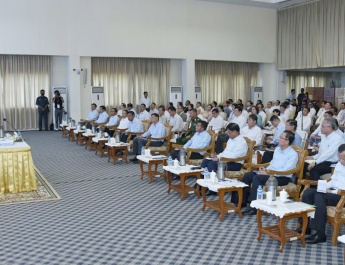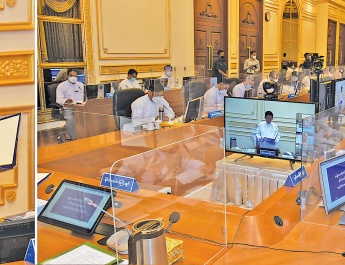Nay Pyi Taw November 23
Acting President of the Republic of the Union of Myanmar, Chairman of the State Security and Peace Commission, Senior General Min Aung Hlaing inaugurated the University of Agriculture and Livestock Breeding (Maubin) under the Ministry of Agriculture, Livestock and Irrigation this morning.
First, the Senior General and party arrived at the university where the Senior General and party were warmly welcomed by the Union Minister for Agricul-\ture, Livestock and Irrigation, officials and students.
Also present at the ceremony were Commission Secretary Joint Executive Chief General Ye Win Oo, Commission member and Union Minister for Border Affairs Lt-Gen Yar Pyae, Union Ministers U Min Naung, Dr Myo Thein Kyaw and U Myo Thant, Ayeyawady Region Chief Minister U Tin Maung Win, senior military officers from the Office of the Commander-in-Chief, deputy ministers, officials from the Ministry of Agriculture, Livestock and Irrigation, departmental officials, rectors, pro-rectors, teachers, students and guests.
Commission Secretary Joint Executive Chief General Ye Win Oo, Commission member and Union Minister for Border Affairs Lt-Gen Yar Pyae, Union Minister for Agriculture, Livest-ock and Irrigation U Min Naung, Union Minister for Science and Technology Dr Myo Thein Kyaw and Ayeyawady Region Chief Minister U Tin Maung Win cut the ribbon to inaugurate the ceremony.
The Senior General unveiled the signboard of the main building of the university.
The Senior General had documentary photos taken together with attendees.
The Senior General sprinkled scented water on the plaque of the main building.

At the second section of the ceremony, students performed dances in commemoration of the opening of the university.
Speaking on the occasion, the Senior General said that the inauguration ceremony of the University of Agriculture and Livestock Breeding (Maubin) marks a momentous and auspicious day for the entire agricultural and livestock sector of the country. It is also a day that can be recorded as a historic milestone for the students who will begin their studies and the teachers who will provide instruction. Opening the university in the 2025-2026 academic year will greatly contribute to the development of the human resources needed in the country’s agricultural and livestock sectors and will, in turn, positively support the nation’s economic growth.

The fundamental objectives of opening the University of Agriculture and Livestock Breeding (Maubin) are to develop the human resources needed for the country’s agricultural, livestock, and rural development; to increase the number of qualified professionals with degrees in agricultural science and livestock science; to enable students to study and acquire modern techniques and skills required for agricultural and livestock enterprises as well as basic agribusinesses; and to strengthen their ability to conduct practical, applied research effectively.
In addition, the university aims not only to provide subject-based teaching and learning but also to develop into a research-oriented university that can produce agricultural and livestock professionals capable of meeting international standards. It is expected that the university will produce graduates equipped with knowledge and skills who can link agricultural and livestock disciplines with basic agroproduction enterprises and other related economic activities.
As a country whose economy is based on agriculture and livestock, the agricultural and livestock sector serves as a key driver of national economic development. Looking at the international context, developed countries have built their economies on agriculture and livestock, enabling them to progress into industrialized nations. Similarly, developing countries rely on agriculture and livestock to ensure food security, increase prosperity, expand production, and transform their nations through MSME enterprises. In our country as well, with abundant water and land resources and favourable climate conditions, efforts are being made to develop agriculture and livestock activities and promote future economic growth.
The agricultural sector con-tributes up to 23.7 percent of the country’s gross domestic product (GDP), and approximately 46 percent of the nation’s population is rural residents earning their livelihood through agricultural, livestock, and related activities. Only when the agri-cultural and livestock sector develops and the incomes of rural residents increase can rural development, in turn, contribute to the overall economic growth of the country.
Myamar has abundant arable land, diverse climates suitable for growing a variety of crops, and rich freshwater resources, which not only ensure domestic food security but also allow surplus agricultural and fishery products to be exported abroad. In particular, the Ayeyawady Region has a long-standing historical reputation as the “granary” of Myanmar.
The opening of the University of Agriculture and Livestock Breeding (Maubin) will meet a major need of the Ayeyawady Region and is expected to promote the development of agricultural and livestock activities in the region, thereby contributing to the overall growth of the country’s agriculture and livestock sector.
Previously, Myanmar had only one university of irrigated agriculture and only one veterinary university. At present, the University of Agriculture can produce about 300 agricultural graduates per year, while the University of Veterinary Science produces around 200 graduates annually. Since the two universities established during the colonial era have been unable to produce a sufficient number of graduates needed by the country, addressing this shortfall has remained a necessary priority.
Since taking office in 2021, the government has been striving to produce more highly qualified agricultural and livestock graduates, mid-level diploma holders in agriculture and live stock, and recognized subject-matter experts in these fields to meet the needs of the country. In this effort, 89 industrial, agricultural, and livestock and basic education high schools, along with nine agriculture and livestock institutes derived from 15 institutes of agriculture were established. Additionally, one Fisheries Institute (Twantay) and one veterinary institute were also expanded. As a result, a total of 8,352 human resources have been trained and produced compared to previous periods. The newly opened University of Agriculture and Livestock Breeding (Maubin) is expected to produce 300 agricultural and livestock graduates annually. Furthermore, efforts are being made to establish a new agriculture and livestock university in Upper Myanmar, and discussions are ongoing to open one agriculture and livestock college in each region and state as part of future planning.
It is reported that the University of Agriculture and Livestock Breeding (Maubin) aims to become a top-tier university like Yezin Agricultural University and the University of Veterinary Science, and efforts will be made to successfully realize this ambition as planned. The University of Agriculture and Livestock Breeding (Maubin) is composed of 13 major departments related to agricultural science, 12 major departments related to animal husbandry science, and 3 basic science departments. It is planned to gather qualified teachers and specialist experts from various departments to provide instruction. It is also suggested that for some subjects, experts should be invited as visiting professors to teach, and seminars and paper reading sessions should be held to strive for comprehensive coverage without omissions in all aspects. Postgraduate pro-grams, including postgraduate diplomas, master’s degrees, and doctoral degrees, will be successively offered. This will enable the cultivation of high-quality human resources needed for national development. It is desired to state that, in line with the university’s motto “Agricultural and Livestock Breeding Bring Prosperity to the Nation,” it will become a reliable university for the development of the country.
Agricultural and veterinary sciences are typically viewed merely as applied sciences. In reality, the 13 subjects related to agricultural sciences, including soil science, biology, and botany, and the 12 subjects related to animal husbandry sciences, including animal husbandry, veterinary medicine, surgery, and reproduction, along with their theories and technological principles, are vast. Understanding these aspects and being able to operate in harmony with nature such as water, land, and climate requires the perspective of arts disciplines, problem-solving skills, an understanding of farmers’ and livestock breeders’ perspectives, and the art of managing socio-economic factors. Therefore, graduates will not only be equipped with scientific knowledge but also with critical thinking and management skills. Students are urged to study diligently.
Since the University of Agriculture and Livestock Breeding (Maubin) plans to also confer degrees in animal husbandry, graduates and rural residents can not only engage in agricultural work but also earn income from livestock farming during the off-season, thereby increasing family income and reducing poverty. Ayeyawady Region is a major region for cultivating, producing, and distributing rice in Myanmar and also has numerous fish and prawn farming operations. However, within Ayeyawady Region, there are extensive areas of deep-water and low-lying fields that are not yet fully utilized for agricultural purposes. It is necessary to expand integrated farming and livestock systems. It is recommended that the University of Agriculture and Livestock Breeding (Maubin) research these systems and strive to test and implement them successfully.
Investment in human resource development for the agriculture and livestock sector will fulfill objectives such as meeting the food needs of a growing population, ensuring the sustainability of natural resources, improving the socio-economic lives of rural residents, and increasing the production of high-value agricultural and aquatic products. Students currently studying agriculture and veterinary sciences at this university are urged to pass on knowledge through generations and, in line with the university’s motto “Agricultural and Livestock Breeding Bring Prosperity to the Nation,” contribute to the success of the national agriculture and livestock sector for the benefit of the country and its people, carrying the responsibility forward progressively. The university is also instructed to strive continuously to produce a steady stream of agricultural and livestock experts.
Following this, the Union Minister for Agriculture, Livestock and Irrigation explained the purpose and activities behind the opening of the University of Agriculture and Livestock Breeding (Maubin).
Subsequently, the Union Minister presented a commemorative gift for the opening of the University of Agriculture and Livestock Breeding (Maubin) to the Senior General.
After the ceremony, the Senior General cordially greeted the attendees.
Later, in the university auditorium, the Union Minister for Agriculture, Livestock and Irrigation explained the construction work undertaken for the University of Agriculture and Livestock Breeding (Maubin), the preparations for its opening, the ongoing appointment of teachers, the organization of teaching departments, the enrollment of students from regions and states for the 2025-2026 academic year, the planned provision of student stipends, the planned annual student enrollment, and the ongoing construction of necessary university buildings. Commission Member Union Minister for Border Affairs explained the situation regarding the enrollment of students at the Border Areas National Races Youth Development Training School (Maubin), the pass rates for the university entrance examination by academic year, and the support provided to students.
The Union Minister for Science and Technology explained the details of the Government Technical High School (Maubin), the construction of workshop and administrative buildings, the appointment of teaching staff, the enrollment of students, the offering of specialized courses, and the provision of short-term training based on regional needs.
Regarding these presentations, the Senior General stated that previously there was only one University of Agriculture and Livestock Breeding in the country. Therefore, he had striven since 2021 to open the University of Agriculture and Livestock Breeding (Maubin), but its opening was delayed for various reasons. Arrangements are being made to provide stipends to students attending Universities of Agriculture and Livestock Breeding. Since the country’s economy is primarily based on agriculture and live-stock, moving beyond traditional methods to modern, systematic agricultural and live-stock practices would be highly beneficial. Therefore, efforts are underway to produce agricultural and livestock experts, aiming to develop agrobased industries. The state is striving to enhance the education level of its citizens, and all responsible departmental officials must collaborate to ensure an abundance of educated human resources for the essential agricultural and livestock sectors. Collaboration is also needed to increase promotion rates in basic education schools. Efforts to enhance education levels for rural development are necessary. In line with the national directive “Let us ensure education sector for the development of the Nation,” support must be provided for the development of education.
When constructing universities, a long-term vision is needed, requiring the establishment of a Master Plan and systematic construction. Shade and wind-break trees, along with trees representing the university, should be planted within the campus grounds. The University of Agriculture and Livestock Breeding must produce the quality human resources needed by the state and strive to develop capable agricultural and live-stock experts.
Following this, the Senior General signed the guest book of the University of Agriculture and Livestock Breeding (Maubin).
Then, the Senior General, and his entourage toured the University of Agriculture and Livestock Breeding(Maubin), the Border Areas National Races Youth Development Training School (Maubin), the Government Technical High School (Maubin), and the Poly-technic University (Maubin) by car, inspected them, and pro-vided necessary instructions based on the reports submitted by the responsible officials.







